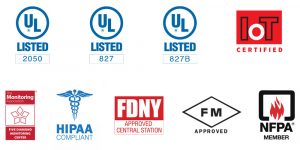 Back to Blog
Back to Blog
Certifications and listings do not paint the complete picture of a life safety monitoring center’s preparedness and capabilities, but they do speak to its adherence to best practices and recognized operating standards.
This article explains the common industry standards that are followed by leading monitoring centers. Most of these certifications require auditing and inspection by accredited, independent parties on regular cycles.
UL 2050
UL 2050 is the standard for National Industrial Security Systems. Broadly speaking, the UL 2050 standard is primarily concerned with the installation and maintenance of high security intrusion systems at government and/or national defense facilities. These systems must be monitored at a monitoring center that meets the UL 2050 requirements. Although you may not have sites that require UL 2050 compliant monitoring, it is an indication that the monitoring center has met very stringent requirements.
UL 827
UL 827 – The Standard for Central Station Alarm Services—is the most common standard that monitoring centers use to differentiate themselves from their competition. The UL 827 standard—from the same people who test your toaster and television for electrical safety—is the baseline standard that governs what kinds of equipment can be used to perform monitoring, the redundancy requirements for monitoring critical systems, acceptable staffing level minimums to respond to alarm events, how quickly events must be handled, and what rules must be followed when responding to such events.
Except in very specific circumstances, having the UL 827 designation is almost a requirement for a monitoring center. Many insurance companies require that their customers utilize UL 827 Listed monitoring centers, and monitoring centers that cannot or choose not to meet the requirements of UL 827 are likely not operating with the level of care, expertise, and reliability that you desire.
UL 827B
While many monitoring providers have the UL 827 listing, very few have the video-specific counterpart listing, UL 827B. This standard builds upon the requirements of UL 827 but adds specific video handling, server system, and procedure requirements. These include network redundancy and monitoring of real-time bandwidth capacity utilization for video traffic. Affiliated Monitoring became the first third-party monitoring center in the United States to attain this listing in 2018.
TMA Five Diamond
The TMA Five Diamond program identifies monitoring centers that are a cut above, not only in facilities and redundancy, but also in the areas of operating procedures, training, and management. Governed by The Monitoring Association, the industry trade group that assists organizations, such as UL, craft the standards above, any monitoring center that achieves Five Diamond certification must meet the following criteria:
- Commit to random inspections and quality criteria standards by a nationally recognized testing laboratory such as UL, FM Approval, or Intertek / ETL.
- Commit to the highest levels of customer service.
- Commit to ongoing job-related education and testing by having 100% of its central station monitoring specialists certified using the TMA online training series.
- Commit to raising the industry standards through TMA membership and participation in its activities.
- Commit to reducing false dispatches.
HIPAA Compliance
Unlike the other standards or certifications discussed, HIPAA Compliance is focused on data privacy and storage rather than monitoring center operations. HIPAA (Health Insurance Portability & Accountability Act) creates recognized practices for the storage and use of patient health data in the United States.
FDNY Approved
While having a monitoring center that is approved to monitor fire alarms in New York City may at first not seem relevant to your business, approval by the Fire Department of New York (FDNY) is one of the most difficult-to-achieve certifications in the monitoring industry. FDNY approved monitoring centers must exceed UL standards in many ways, and FDNY audits are not only notoriously detailed but sometimes part of a surprise inspection. FDNY certified monitoring centers must provide a regular, intensive training program for its FDNY approved monitoring agents, and each approved operator must pass tests given by the FDNY. Any monitoring center that maintains FDNY approval is very likely to be highly organized, disciplined, and ready for just about anything.
FM Approved
FM Approval is an additional certification that a monitoring center may pursue to demonstrate its commitment to industry-recognized standards. For many years, FM represented insurance companies who required their policyholders to have alarm systems monitored by an FM Approved monitoring center. The FM Approved standard for monitoring centers is similar to (but not exactly the same as) the applicable UL standards. Meeting the requirements of both FM and UL demonstrates a commitment to the rigorous and nuanced sets of auditing checklists.
What Certifications Does Affiliated Monitoring Have?

Have a Special Customer Requirement?
Our dedicated team of Account Managers would be happy to speak with you further about our certifications and listings and why they are critical to your success. Perhaps you have a unique customer need that we can assist with? Call us at (800) 296-9000 or click here to submit an online request.

